Catalunya Independence Revolt Rocks Spain as Separatists Rally
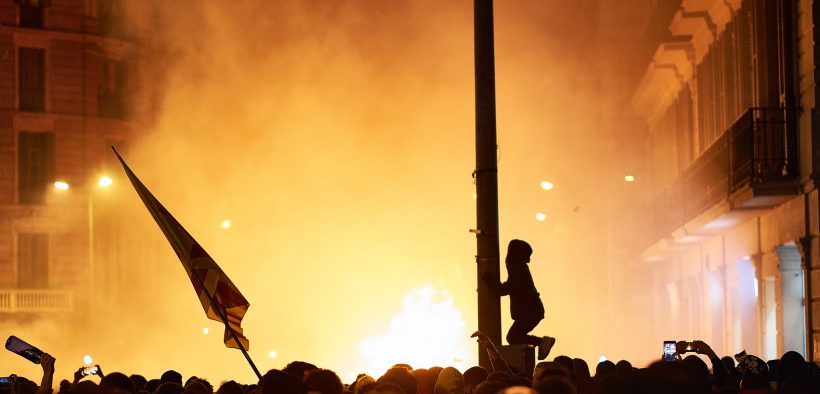
The Catalunya independence movement in Spain shows no signs going away despite violent crackdowns and lengthy prison sentences handed out by the Spanish government.
On October 14, nine imprisoned members of the Catalunya independence movement were found guilty of sedition and lesser crimes, and though they dodged the more serious charge of “rebellion,” the verdict has sparked mass protests and upheaval in Barcelona and other major Catalan cities in Spain.
Over the last few years, the Spanish government has struggled to get a handle on the Catalunya independence movement and in its attempt to rein in the uprising has been condemned for human rights violations. The recent protests suggest the movement is not disappearing anytime soon despite the Spanish government’s best efforts.
Spain’s Catalunya Region Explained
Many of the autonomous communities that are part of modern-day Spain are not really Spanish. Areas such as Catalunya (also known as Catalonia), Galicia and Basque Country have their own languages, cultures and political leanings that are completely different from what comes to mind when the average American thinks of Spain.
The communities are mostly in northern Spain, far from the sunny, flamenco-filled streets of Seville and the country’s capital city of Madrid. For centuries, even after Spain annexed these kingdoms, they enjoyed relative political and social autonomy. They were free to make their own laws, speak their own language and educate their children as they saw fit.
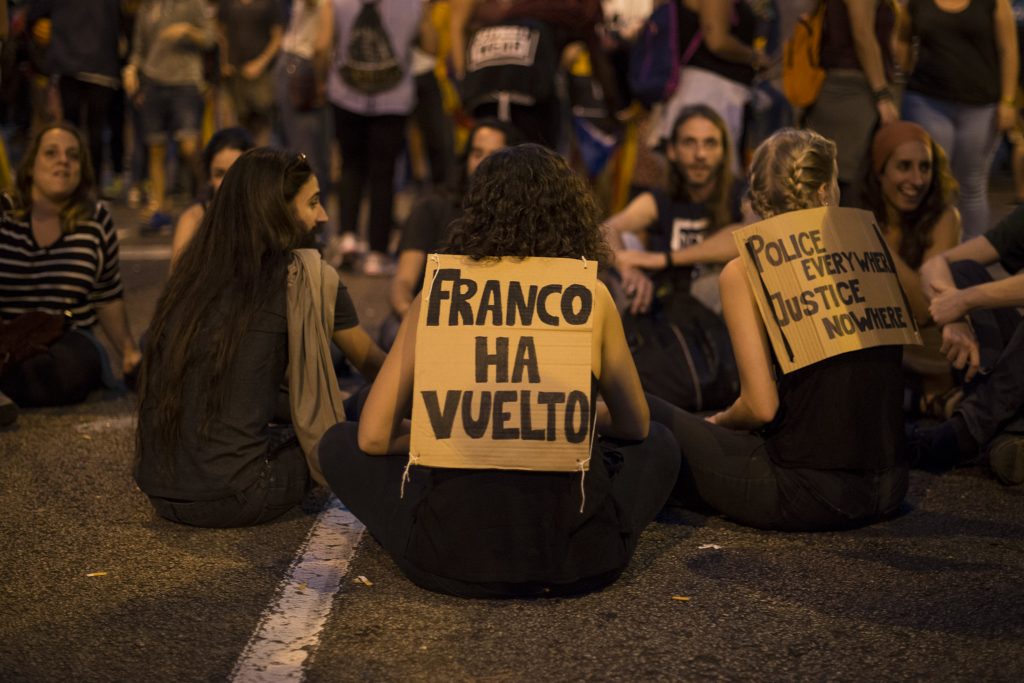
Hundreds of thousands of people march through the streets of Barcelona during the general strike in Catalonia, called as protest against police violence during the day of the referendum on independence of Catalonia. Date: October 3, 2017. (Photo: Adolfo Lujan)
Gradually, the power of the autonomous communities began to decrease, but when Franco’s dictatorship began after the end of the Spanish Civil War in 1939, he stripped the communities of all rights related to self-governance and preservation of local culture to establish a homogenous Spain routed in Castilian identity.
He made it illegal for children to be taught Basque, Catalan and Gallego in schools, and people were often imprisoned and tortured for no crime other than speaking their native tongue. Many people in these regions still long for independence, and those that are active in the various Catalunya independence movements still face severe consequences from the Spanish federal state, even though Franco’s dictatorship ended in 1977 with his death and Spain is now run by a “democratic” government.
In the past, groups such as the Basque separatists Euskadi Ta Askatasuna, commonly known as the ETA, held more political clout and garnered more media attention than the Catalan separatist movement. But today, in modern Spain, the struggle between the national government and the various autonomous communities is most visible in Catalunya, home to one of Spain’s most popular tourist destinations, Barcelona.
Prosperous Catalunya
Catalunya is one of Spain’s wealthiest regions due to its strong industrial and tourism sectors. Its residents make up 16% of Spain’s total population and its economy contributes to nearly 19% of Spain’s GDP. Tax dollars from Catalunya help support Spain’s poorer regions, such as Andalucía and Extremadura, which is part of the reason why people from these regions are normally strongly opposed to the idea of Catalunya independence.
Regions such as Galicia and Catalunya are technically considered “autonomous communities,” but for the most part, they are autonomous in name only. In 2006 laws were passed granting Catalunya greater independence than it had enjoyed since the pre-Franco years, with some even referring to Catalunya as a “nation,” but following the 2008 financial crash and the subsequent political fallout, these were all repealed by 2010.
Catalunya has significantly more job opportunities than parts of Spain such as Andalucía, many people who live in the community are not Catalan but come from other parts of Spain or other countries. As a result, pro-independence political parties hold the majority of seats in the Catalan parliament, but only by a slim margin. The popular consensus is also mixed, with most data indicating that about 44% of Catalans support Catalunya’s independence from Spain.
Catalan Parliament Declares Independence
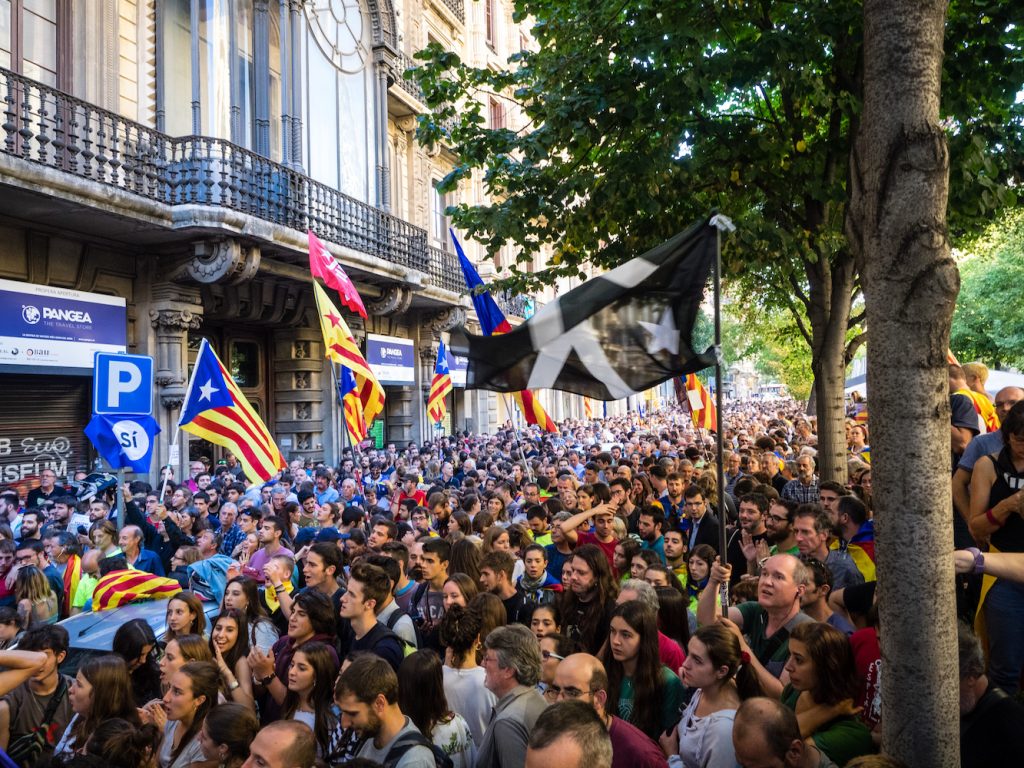
Protests in Barcelona after Spanish police raided Catalan government buildings, September 20, 2017. (Photo: Liz Castro)
The Catalan separatists don’t have the best reputation outside of Catalunya either. Many people in other regions view them as troublemakers attempting to create political and social divisions that do not need to exist.
José Rianxo, a high school teacher in Galicia, told Citizen Truth, “They’ve managed to divide the people of Catalunya into two opposing sides, something that they should not be proud of. You should only start the process of secession if you have a clear majority of the population in favor of it, which isn’t the case in Catalunya.”
Catalunya has held a number of referendums to provide its citizens the opportunity to vote for Catalunya’s independence, most recently and notably on Oct. 1, 2017. On this early October morning, individuals at the polls were met with nightsticks and rubber bullets from the Guardia Civil and Spanish national police, with some disturbing images showing national law enforcement officers beating innocent people as they attempted to cast their votes. For many individuals in Catalunya and in other parts of Spain, this conjured up disturbing recollections of the terror and repression that existed during Franco’s regime.
Despite these obstacles, the Catalan parliament declared independence Oct. 27, 2017, which led to the Spanish national government using legal powers akin to executive orders in the United States to dissolve the Catalan parliament and arrest a number of Catalan politicians. Those arrested included many big names in Catalan politics, including a deputy premier, government ministers, cabinet members and the former speaker of the Catalan parliament.
Catalan Separatist Leaders Imprisoned
Most of the leaders behind the October 2017 referendum, commonly referred to as “1-0,” were imprisoned in Madrid shortly after the referendum. One of the national government’s favorite tactics in their assault on separatist movements is to incarcerate political prisoners far away from their homelands. The imprisoned Catalan separatist leaders have been held in Catalonian prisons since July 2018, but many political prisoners linked to the Galician and Basque independence movements are still incarcerated far away from their family and friends, which has led to conflict between the Spanish national government and these regions.
On Oct. 14, 2019, nine of the imprisoned Catalonians were found guilty of sedition and other less serious crimes, and though they dodged the more serious charge of “rebellion,” which can merit a sentence of up to 25 years, some of them face up to 13 years of incarceration.
The majority also face political sanctions such as bans against holding public office after their release.
The head of the Catalan Republican Left party and former deputy premier of Catalunya, Oriol Junqueras, received the stiffest sentence: 13 years in prison for the crimes of sedition and misuse of public funds. Other government ministers including Raül Romeva and Dolors Bassa face 12-year prison sentences.
Spain Accused of Human Rights Violations
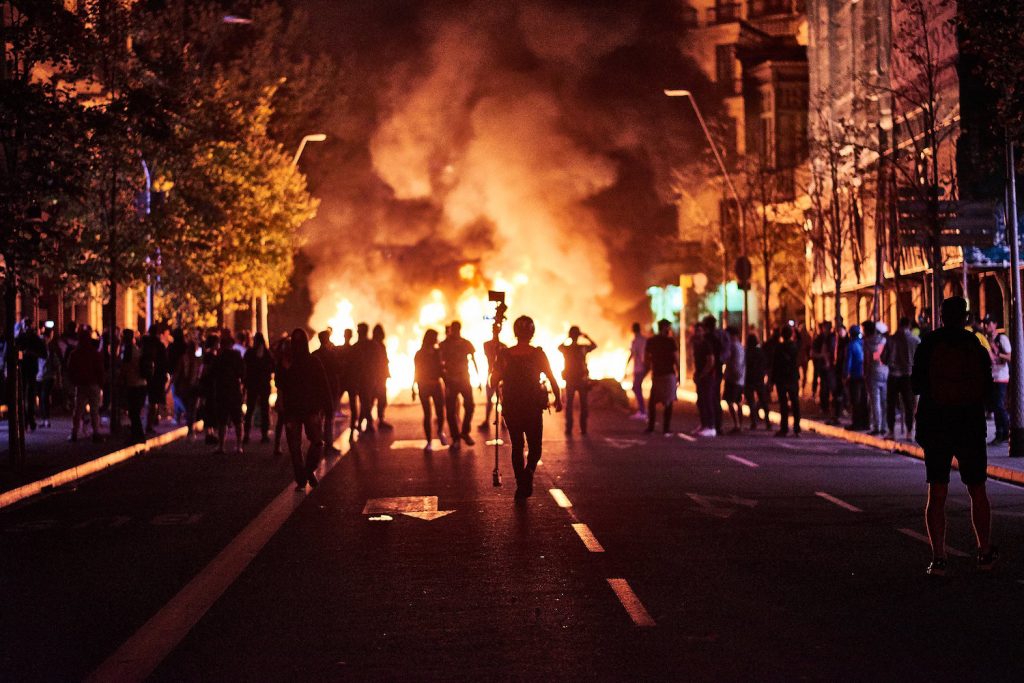
October 18, 2019 protests in Catalonia, Barcelona. (Photo: Masha Gladkova)
Spain’s manner of handling separatist movements has drawn ire and concern from the international community, and the Spanish national government has been accused of human rights violations by a number of groups. Lawyers for the imprisoned politicians have reported that they intend to appeal the decisions with the Spanish Constitutional Court and are also considering bringing the case before the European Court of Human Rights.
The Spanish government intends to try six other Catalan political leaders who fled the country following the fallout after the referendum attempt, including the former Catalan premier Carles Puigdemont. Puigdemont currently resides in Waterloo, Belgium, and leads a quasi-government in exile called the “Council of the Republic,” which includes other self-exiled Catalan political figures such as education minister Clara Ponsatí, health minister Toni Comín and culture minister Lluis Puig.
Most nationally syndicated Spanish newspapers have been supporting the sentence, claiming that it is not a spiteful, revenge-driven attack on the Catalan people, but rather simply upholding the law. Many members of the general population agree and see the separatist’s Catalunya independence movement as subversive and disrespectful of Spanish federal law.
Rianxo stated that “Although there is a certain lack of sensitivity in some sectors of the national government with regard to historic nationalities, these can only be remedied within the legal system.” He added, “I think that the solution to the problem is to change the Constitution to define Spain as a federal state. The decision made by the Catalan separatists rests on the margin of legality and distances us from a possible consensus around this idea.”
Mass Protests After Catalunya Independence Leaders Sentenced
However, in many parts of Spain, including Galicia, there have been many actions of solidarity undertaken to support the imprisoned Catalan separatists, with mass protests mirroring the Catalan “Tsunami Democratíc” taking place in cities such as Santiago de Compostela and Vigo.
The “Tsunami Democratíc” has been behind the majority of the demonstrations against the unusually harsh sentences given to the Catalan leaders and is similar to the social media-driven movements behind the demonstrations in Hong Kong and other areas. As of now, its leaders are unknown to the Spanish national government and the general public, but acting Interior Minister Fernando Grande-Marlaska has said that the government is working on all fronts to figure out who is behind the movement.
“Of course there are investigations, we have efficient intelligence services, and we will end up knowing who is behind these actions by Tsunami Democràtic,” Grande-Marlaska told reporters.
Since the sentencing, the Catalan leaders, Barcelona and other major Catalan cities such as Tarragona and Girona have been rocked with large protests led by angry Catalan citizens. The demonstrations at Barcelona’s Josep Taradellas-El Prat Airport have been so severe that more than 110 flights have been canceled so far.
The Mossos d’Esquadra, Catalunya’s autonomous police force, responded with violence against the protesters, releasing a barrage of foam bullets that injured many so severely they had to be hospitalized. Members of the Spanish National Police were also present, indiscriminately firing rubber bullets into the crowd and wounding one man so severely he lost an eye.
Many passengers who were supposed to be on those flights are now stranded at the airport, dealing with their situations the best they can. Josephine and Filippo Musarella, who were supposed to catch a flight to Nice from the airport, ended up having to spend the night in the terminal after their flight was canceled.
According to Josephine, “We did our best to get through the night. We slept here, on these cardboard boxes. They just told us that we have seats on a flight this afternoon, but we’ll see if that’s true.”
Protesters also obstructed traffic at the major intersection of Passeig de Grácia and Gran Vía in Barcelona, while more than 25,000 people filled the city’s Plaça de Catalunya. Many of these individuals would later end up at the airport protests. Thousands of other protesters flooded downtown Barcelona’s streets on Monday night to demand that the imprisoned leaders be acquitted.
Catalunya Independence Members Jailed on Terrorism Charges
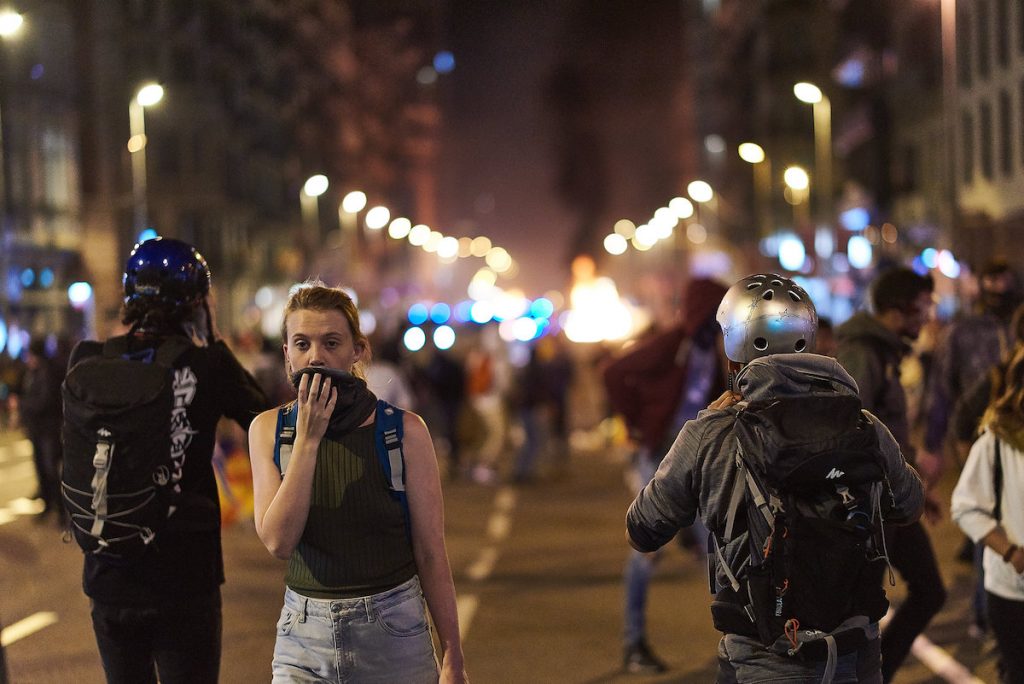
October 18, 2019 protests in Catalonia, Barcelona. (Photo: Masha Gladkova)
The Catalan politicians aren’t the only separatists facing lengthy prison sentences. Seven individuals charged with crimes related to terrorism and planning acts of violence are currently being held in pre-trial custody. The individuals are members of the Comités de Defensa de la República (CDR), an activist group working toward Catalan independence. According to Judge Manuel García-Castellón of the Audencia Nacionál, Spain’s high court, the individuals belong to a violent faction of the CDR “that aims to instate a Catalan republic via any means, even violent ones.”
The seven individuals are currently being detained under the charges of possession of explosives, conspiracy to cause harm and belonging to a terrorist group. They were arrested during “Operation Judas,” a Guardia Civil operation that consisted of police raids on private property in the Catalan cities of Sabadell, Barcelona and Santa Perpètua de Mogoda.
The prisoners have also been implicated in attempting to establish a secret channel to convey sensitive political information between Catalunya and the exiled Catalan leaders in Belgium.
What’s Next For the Catalunya Independence Movement?
Both hardline Catalan separatists and the Spanish national government appear unwilling to compromise on the issue of Catalan independence, and it appears as if both sides have decided that making any concessions in an attempt to reach an agreement would be akin to sacrificing all their values and political ideas.
Rianxo explains, “We live in an era where political parties are incapable of reaching an agreement with each other and act only in their own self-interest. This makes it very difficult to resolve extremely complex issues. I think that in this day and age it doesn’t make sense to create new countries out of territories in Spain; however, within the Constitution there exists the possibility to allow for different sensibilities that different areas might have. The problem is that nobody is interested in compromising.”
One of the great things about a democratic government is that systems and policies can change, but only with the support of the people. However, the will of the people is never as clear as one would like it to be, and as a result, change through democratic processes is often a long and difficult journey. The future of Catalunya is unclear, and it will remain so until extremists on both sides continue to put their political ideologies before the will of the people.







